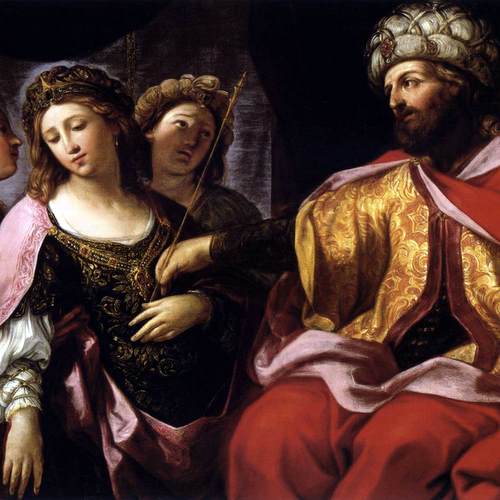Names of the Book
| English: | Esther |
| Hebrew: | אסתר |
| Transliterated: | Ester |
| Other names: |
 Who
Who
| Wrote the book: | unknown, possibly Mordecai |
| Are the key people: | Esther, Mordecai, King Zerxes I, Haman |
| Is it written to: | The people of Israel |
 What
What
| Esther is chosen and becomes queen (Esther 1:1-2:23) |
| The Jews are threatened and fear extinction (Esther 3:1-4:17) |
| Esther intercedes and seeks the king's favor (Esther 5:1-8:17) |
| The Jews are delivered and overcome their enemies (Esther 9:1-10:3) |
 When
When
| Was it written: | c 520 BCE |
| Did the events occur: | c 532-521 BCE |
| Was it canonized: | c 499-100 BCE |
| (see the Timeline of the Tanakh) | |
 Where
Where
| Was it written: | Persia |
| Did the events occur: | Susa |
 Why
Why
| Esther was written to inform us that: |
| G-d is sovereign over all of history. |
| The enemies of G-d seek the destruction of the Jews. |
| G-d provides deliverance for the Jews. |
| G-d expects us to act where He places us. |
| G-d provides wisdom. |
 Introduction
Introduction
The book of Esther never mentions G-d's name, yet G-d clearly orchestrates all of the events in it. In this historical narrative, Esther, a Jew living among the exiles in Persia, becomes queen of the empire. Haman, a Persian official, seeks to annihilate all the Jews in the kingdom (Esther 3:12), but God had prepared Esther "for such a time as this" to save his chosen people. The book documents the origins of the Jewish observance of Purim, which celebrates the events of the book: Israel's survival and God's faithfulness.
Scripture- Book Selection
| Chapter | Description |
| 1 | King Ahasuerus rules over Media-Persia and holds a feast. At the end of the feast, Ahasuerus orders Queen Vashti to appear before him but she refuses. The king becomes angry and banishes her from his presence forever. |
| 2 | Ahasuerus orders a search for a new queen from among the virgins of his kingdom. Although many virgins appear before him, the king chooses Hadassah, also called Esther to be his new queen. Esther's uncle, Mordecai, hears of a plot against the king and relates the plot to Esther, saving the king's life. |
| 3 | One of the court officials, Haman, is promoted and others bow and pay homage to him. Mordecai the Jew does not bow to Haman which makes Haman angry. Haman plots to kill Mordecai and deceives the king into writing a law to kill all Jews in the kingdom on the thirteenth day of the twelfth month. |
| 4 | Mordecai and the Jews learn about the death law and mourn. Mordecai informs Esther of the law and advises her to speak with king. She initially refuses: to appear before the king without being summoned means death. Mordecai convinces Esther to go to the king. Esther requests all the Jews in the city fast for three days. |
| 5 | Esther risks her life and appears before the king. The king welcomes Esther and asks what she desires. Esther invites the king and Haman to a banquet. Haman plans to kill Mordecai on a gallows fifty cubits high. |
| 6 | The king learns that Mordecai had previously saved the king's life but was not rewarded. The king asks Haman to honor Mordecai. |
| 7 | Esther tells Ahasuerus of Haman's plan to kill the Jews and how it will mean her own life as well. The king becomes enraged and Haman begs Esther for mercy. The king commands Haman to be hung on the gallows Haman had prepared for Mordecai. |
| 8 | The king gives Haman's estate to Esther who appoints Mordecai to run it. Mordecai is promoted as a ruler over the kingdom. Esther begs Ahasuerus to save the Jews but laws in Persia and Media cannot be repealed. Mordecai makes a law allowing the Jews to defend themselves on the day they were to be killed. |
| 9 | Jews defend themselves and kill over 75,000 of their enemies. Haman's sons are hung and killed. The Jews celebrate their victory and "Purim" is declared an annual festival. |
| 10 | King Ahasuerus lays a tribute on the land and on the coastlands of his kingdom. Mordecai's story is recorded in the book of the Chronicles of the Kings of Media and Persia. Mordecai is a well-liked and powerful ruler under King Ahasuerus who seeks the welfare of his whole nation. |
